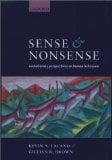 Sense and Nonsense: Evolutionary Perspectives on Human Behaviour
Sense and Nonsense: Evolutionary Perspectives on Human Behaviour
by Kevin N. Laland and Gillian R. Brown
Oxford, £17.99 (hb), ISBN 0-19-850884-0
Evolution is the central idea in biology, so it makes sense to use it to take a good scientific look at human behaviour: in principle, human sociobiology is unobjectionable. So why did the actual results of this discipline (or at least the results as they reached a mainstream audience) seem such tosh: oversimplified and skimpily-supported speculations which conveniently reproduced historically local social norms? And just what do memeticists do all day? If, like me, you have ever asked these questions then you will be both pleased and illuminated by this book. The authors are Cambridge zoologists whose preparation for this book included talking to many of the major current researchers. The result is a model of clear science writing (I found myself agreeing with the flattering blurb). It starts with a historical discussion which takes us from the ethologists (politely trashing the deeply irritating populariser Desmond Morris, I’m pleased to say) to the fracas which followed the publication of E.O. Wilson’s Sociobiology. In fact, the term ‘sociobiology’ is rarely used these days. The authors then take us through the strengths and weakness of the four contemporary approaches. It seems that much of the work now being done is genuinely low on speculation and high on actual data: ‘human behavioural ecology’ seemed the most fanciable of the options to me. So what do memeticists do all day? Well, the authors tell us what they could be doing: just give it a few years…



